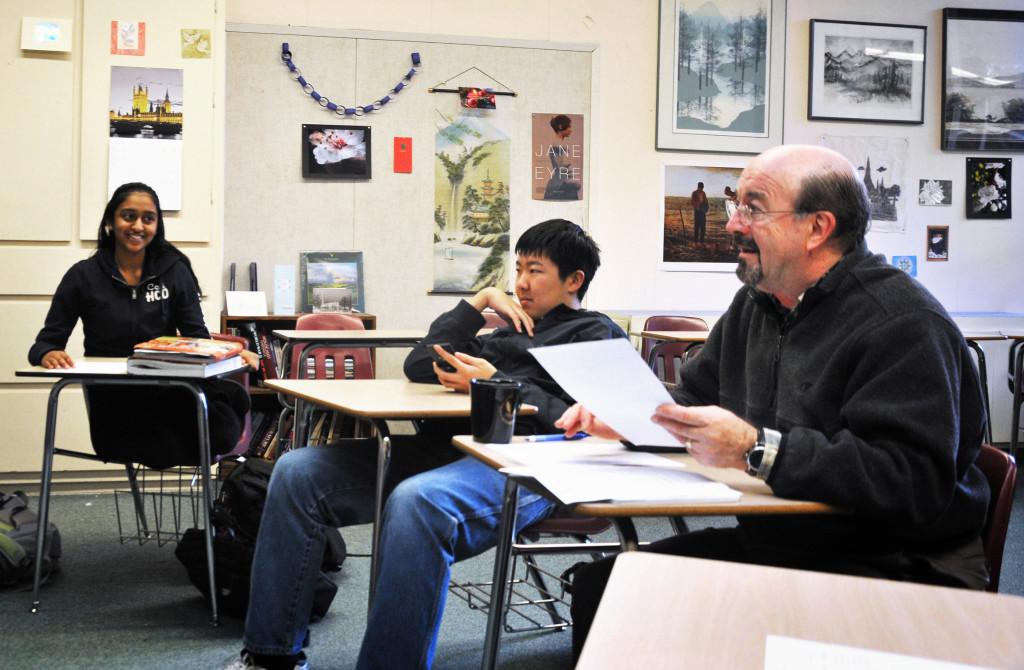Results from 2012 ethics survey surprise students
During advisory period today, students discussed the recently released statistics from The Ethics of American Youth survey, administered in March 2012 and created by the Josephson Institute of Ethics.
Some of the 2012 results, when compared to those of the 2010 school year, were relatively consistent and did not alter drastically. Many expressed distinct surprise, though, at several particular results, one of which asked students to either agree or disagree with the statement: “My parents/guardians would rather I cheat than get a bad grade.”
In 2010, two percent of students agreed. In 2012, 79 percent of students agreed, compared to the national average of 10 percent. Many students were shocked to see the drastic difference found between the percentages.
“I was really surprised that people thought that parents would want them to cheat rather than get bad grades, and a lot of people from Harker thought that,” Mary Najibi (9) said.
Some attributed the disparity to students’ misinterpretation of their parents’ desires.
“I think people have different perceptions of their parents and what they actually want from them.” Anika Mohindra (9) said.
On the other hand, certain students accepted the data as fresh insight into the lives of other students.
“Our advisory was most shocked at how many parents condoned cheating for a good grade,” Alice Tsui (12) said. “The jump from two percent in 2010 to 79 percent in 2012 was so crazy that we started to wonder if it was a typo. I think it’s strange how dramatic the change is in a matter of two years.”
The anonymous questionnaire is distributed to over 20,000 students in the United States every two years to gauge their standards for honor and determine unique trends in adolescent behavior.
The study was comprised of many questions regarding the morality of students themselves and their perception of the ethical standards of others. Motives of the activity included discerning how much weight students placed on personal integrity in relation to their pursuit of success and if cheating could be considered socially acceptable if the outcome is favorable.
“[The results] are very accurate for the Harker environment because of the pressure that we have for all our grades and everything,” Daniela Lee (10) said. “It just feels like what people think, not necessarily what we do.”
Junior Nicky Semenza believes that the results have more universal implications and that it is impossible to guarantee complete honesty on the survey.
“I think the trustworthiness of the Harker environment has degraded,” he said. “I do think that some people marked [on the survey] what they thought was the right thing to do. Even though it was anonymous, that doesn’t mean people will be truthful.”
Despite the shock, many students still expressed that the general analysis was useful and thought-provoking, leading them to consider their own behavioral conduct.
Sophomore Shikhar Dixit found the discussion “quite beneficial to [his] understanding of ethical and honest behavior.”
“I believe it really helped me as a person. I believe I have changed individually, and I feel like we should have these conversations more,” he said.
The next date for the survey is estimated to take place in late 2013 or early 2014.

Juhi Gupta is the Multimedia Editor for Harker Aquila. She is a junior and has been part of the journalism program since her freshman year. Her position...




![LALC Vice President of External Affairs Raeanne Li (11) explains the International Phonetic Alphabet to attendees. "We decided to have more fun topics this year instead of just talking about the same things every year so our older members can also [enjoy],” Raeanne said.](https://harkeraquila.com/wp-content/uploads/2025/10/DSC_4627-1200x795.jpg)


















![“[Building nerf blasters] became this outlet of creativity for me that hasn't been matched by anything else. The process [of] making a build complete to your desire is such a painstakingly difficult process, but I've had to learn from [the skills needed from] soldering to proper painting. There's so many different options for everything, if you think about it, it exists. The best part is [that] if it doesn't exist, you can build it yourself," Ishaan Parate said.](https://harkeraquila.com/wp-content/uploads/2022/08/DSC_8149-900x604.jpg)




![“When I came into high school, I was ready to be a follower. But DECA was a game changer for me. It helped me overcome my fear of public speaking, and it's played such a major role in who I've become today. To be able to successfully lead a chapter of 150 students, an officer team and be one of the upperclassmen I once really admired is something I'm [really] proud of,” Anvitha Tummala ('21) said.](https://harkeraquila.com/wp-content/uploads/2021/07/Screen-Shot-2021-07-25-at-9.50.05-AM-900x594.png)







![“I think getting up in the morning and having a sense of purpose [is exciting]. I think without a certain amount of drive, life is kind of obsolete and mundane, and I think having that every single day is what makes each day unique and kind of makes life exciting,” Neymika Jain (12) said.](https://harkeraquila.com/wp-content/uploads/2017/06/Screen-Shot-2017-06-03-at-4.54.16-PM.png)








![“My slogan is ‘slow feet, don’t eat, and I’m hungry.’ You need to run fast to get where you are–you aren't going to get those championships if you aren't fast,” Angel Cervantes (12) said. “I want to do well in school on my tests and in track and win championships for my team. I live by that, [and] I can do that anywhere: in the classroom or on the field.”](https://harkeraquila.com/wp-content/uploads/2018/06/DSC5146-900x601.jpg)
![“[Volleyball has] taught me how to fall correctly, and another thing it taught is that you don’t have to be the best at something to be good at it. If you just hit the ball in a smart way, then it still scores points and you’re good at it. You could be a background player and still make a much bigger impact on the team than you would think,” Anya Gert (’20) said.](https://harkeraquila.com/wp-content/uploads/2020/06/AnnaGert_JinTuan_HoHPhotoEdited-600x900.jpeg)

![“I'm not nearly there yet, but [my confidence has] definitely been getting better since I was pretty shy and timid coming into Harker my freshman year. I know that there's a lot of people that are really confident in what they do, and I really admire them. Everyone's so driven and that has really pushed me to kind of try to find my own place in high school and be more confident,” Alyssa Huang (’20) said.](https://harkeraquila.com/wp-content/uploads/2020/06/AlyssaHuang_EmilyChen_HoHPhoto-900x749.jpeg)



